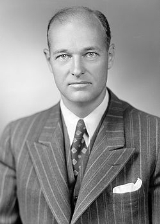
George F. Kennan
Overview
- This article is about the US diplomat and historian. For the explorer and war correspondent, see George Kennan (explorer)George Kennan (explorer)George Kennan was an American explorer noted for his travels in the Kamchatka and Caucasus regions of the Russian Empire. He was a cousin twice removed of diplomat and historian George F. Kennan, with whom he shared his birthday....
.
George Frost Kennan (February 16, 1904 – March 17, 2005) was an American adviser, diplomat, political scientist and historian, best known as "the father of containment
Containment
Containment was a United States policy using military, economic, and diplomatic strategies to stall the spread of communism, enhance America’s security and influence abroad, and prevent a "domino effect". A component of the Cold War, this policy was a response to a series of moves by the Soviet...
" and as a key figure in the emergence of the Cold War
Cold War
The Cold War was the continuing state from roughly 1946 to 1991 of political conflict, military tension, proxy wars, and economic competition between the Communist World—primarily the Soviet Union and its satellite states and allies—and the powers of the Western world, primarily the United States...
. He later wrote standard histories of the relations between Russia and the Western powers.
In the late 1940s, his writings inspired the Truman Doctrine
Truman Doctrine
The Truman Doctrine was a policy set forth by U.S. President Harry S Truman in a speech on March 12, 1947 stating that the U.S. would support Greece and Turkey with economic and military aid to prevent their falling into the Soviet sphere...
and the U.S.
Quotations
A political society does not live to conduct foreign policy; it would be more correct to say that it conducts foreign policy in order to live.![]()
Lecture at Princeton University, Princeton, New Jersey (March 1954); published in “The Two Planes of International Reality” in Realities of American Foreign Policy (1954), p. 4
A guest of one's time and not a member of its household. ![]()
Referring to himself, as quoted in Political Realism in American Thought (1977) by John W. Coffey, p. 26
The best thing we can do if we want the Russians to let us be Americans is to let the Russians be Russian.![]()
As quoted in US-Soviet Relations : The First 50 Years WNET TV
A political society does not live to conduct foreign policy; it would be more correct to say that it conducts foreign policy in order to live.![]()
Lecture at Princeton University, Princeton, New Jersey (March 1954); published in “The Two Planes of International Reality” in Realities of American Foreign Policy (1954), p. 4

